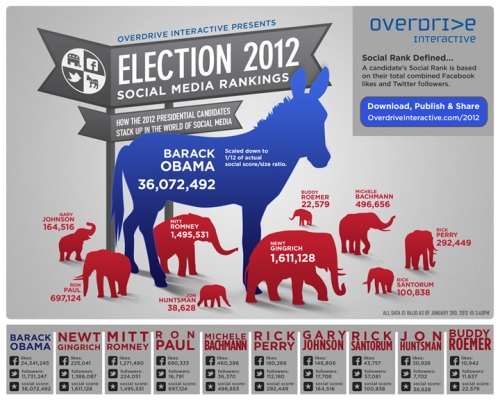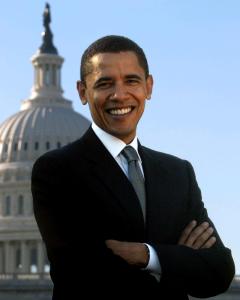It’s well documented that Barack Obama’s use of social media in the 2008 presidential campaign was a huge advantage in building a valuable network of supporters. Importantly, these supporters can be mobilized at a moment’s notice (or hounded for donations continuously). But what’s surprising is that he has largely maintained that advantage even with the increase in social media awareness among Republican presidential candidates and other rivals in 2012. That kind of sustained competitive advantage is difficult to achieve, and I believe it is a product of fortunate timing that will be nearly impossible for future candidates to duplicate.
I would argue that President Obama’s social media dominance is an example of exploiting an inefficient market. According to my amateurish grasp of economic theory, an efficient market is one in which everyone has access to more or less the same information, so there is no sustainable advantage to be gained by anyone in the market over time. Some argue that financial markets work this way, and that all information is instantly reflected in the market. In an inefficient market however, not all information is reflected in the market, and advantages can be gained by having information on securities that may be overvalued or undervalued. I’d like to thank Professor Reuter for that, and also apologize if I butchered it.
Another real-world example of this that illustrates the point is the story of Oakland A’s manager Billy Beane, made famous by the book and movie “Moneyball.” Beane essentially realized that the market for baseball players was inefficient. Teams were using methods of evaluating players that did not best predict their contribution to winning games, leaving some extremely undervalued players out there for the taking. With better information and statistical analysis Beane was able to find valuable players that other teams had overlooked, and build a winning team for less money. Beane’s methods have been criticized by some in recent years for the simple reason that the A’s eventually stopped winning. But in reality, once other teams gained access to his information and started applying it to their own teams, the A’s competitive advantage disappeared. The market became more efficient.
In 2008, the market for voters’ online attention was inefficient. Information on how to reach voters online was not commonly understood and many, including John McCain, seemed unaware even of how important it was. Social media was undervalued, and Barack Obama swooped in on a great investment with serious returns. The charts below were created the month of the election, and compare Obama and McCain’s relative social media presence.
 Charts via Pete Quily: Link
Charts via Pete Quily: Link
What really stands out to me is that the McCain campaign only tweeted 25 times throughout the entire campaign, severely undervaluing the power of that platform. McCain has since become an avid user of Twitter, but obviously far too late. Republican politicians in general have been catching up lately in their awareness and use of social media, with all of 2012’s Republican presidential candidates using Facebook and Twitter often and (relatively) effectively. But surprisingly, Obama has been able to maintain his advantage pretty convincingly.
 Via Overdrive Interactive: Link
Via Overdrive Interactive: Link
It makes sense that the market would become more efficient as candidates realize the real value of social media, so why does that donkey still tower over the herd of elephants at its feet? I think it’s a product of the year that Obama was elected. 2008 was the first true social media election and Obama was the only candidate to take full advantage of it. He built up a formidable following, and had four years to build it up and gain valuable information about his supporters. His head start and continued social media savvy have extended his advantage beyond what I would have expected in such a fast moving medium. In future years, it will be nearly impossible to build that kind of advantage in a national campaign. A candidate might have a slightly better presence by virtue of popularity, but the market is now far too efficient for another Barack Obama to happen.
In full disclosure, I was a donor to the Obama campaign in 2008. I haven’t been so far this time, mostly because I have a wedding to save for. But as a Twitter and Facebook follower, an e-mail and text message recipient, I’ve seen first-hand the amount of skill Obama’s organization brings to social media and how well they target their message even within different supporter groups. I would still argue that their advantage would be unsustainable for much longer, and would be impossible to replicate in the future.
On the other hand, maybe they’re just that good…




